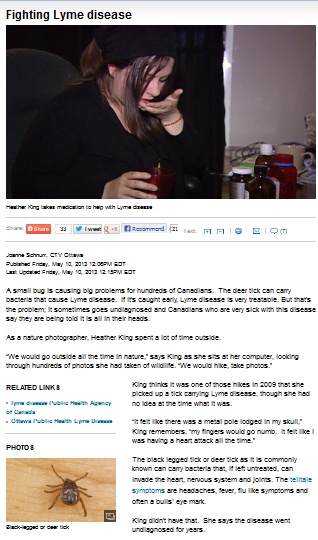 Ottawa has an abundance of parklands that are home to significant wildlife populations, making the job of nature photographers like Heather King relatively easy. However, things took a turn for the worse for King during one of her usual nature hikes in 2009 when she contracted Lyme disease from a black-legged tick. The disease actually went undiagnosed for years, as King didn’t manifest symptoms until it reached a critical stage: “It felt like there was a metal pole lodged in my skull. My fingers would go numb. It felt like I was having a heart attack all the time,” was how she described her tribulation.
Ottawa has an abundance of parklands that are home to significant wildlife populations, making the job of nature photographers like Heather King relatively easy. However, things took a turn for the worse for King during one of her usual nature hikes in 2009 when she contracted Lyme disease from a black-legged tick. The disease actually went undiagnosed for years, as King didn’t manifest symptoms until it reached a critical stage: “It felt like there was a metal pole lodged in my skull. My fingers would go numb. It felt like I was having a heart attack all the time,” was how she described her tribulation.
The black-legged tick carries bacteria, that if not properly treated, can invade the joints, nervous system, as well as one’s cardiovascular system. According to the Public Health Agency of Canada, ticks are commonly found in wooded areas where they parasitically feed off deer and bears, and small animals like mice and squirrels. Thus, even when individuals aren’t in close contact with animals, themselves, it’s possible to unknowingly contract the disease when infected mammals have invaded residential and commercial properties, making wildlife control services necessary.
It’s worth noting that while companies which are focused on wildlife control in residential and commercial areas share the same mission as extermination services, most wildlife control firms employ more humane processes to get the job done. Skedaddle Humane Wildlife Control Inc, for example, has affiliations with organizations like the Society for the Prevention of Cruelty to Animals (SPCA). The efforts of wildlife control specialists can prevent people from coming into contact with disease vectors by keeping the host animals away from homes.
Humane methods of animal control can be as reliable as conventional methods. Highly trained wildlife technicians first identify the entry points on the property, and then remove residents to keep them away from harm. With these services, you won’t have to suffer the fate of King who is still on medications to treat the disease.
The same article brings up the important debate of how Lyme disease is perceived in Ottawa. While it is definitely a matter of grave importance, King believes that there are a good number of Canadians who are not aware of the full extent of the disease, which is why she organized a Lyme Disease Awareness Day in early May. Detecting and addressing the disease early on is definitely an important step towards minimize its effects. Engaging wildlife control companies to contain the possible host animals is just as crucial to preventing the spread of Lyme disease.
With 14 reported cases of Lyme disease in Ottawa in 2012, the disease has, thankfully not reached an alarming level. However, as the case of King proved, once a person is afflicted with this disease, the results can be truly debilitating. For this reason, Ottawan property owners must be on the lookout for any wildlife that invade their properties, and seek the services of specialists who can provide wildlife control in Ottawa.


